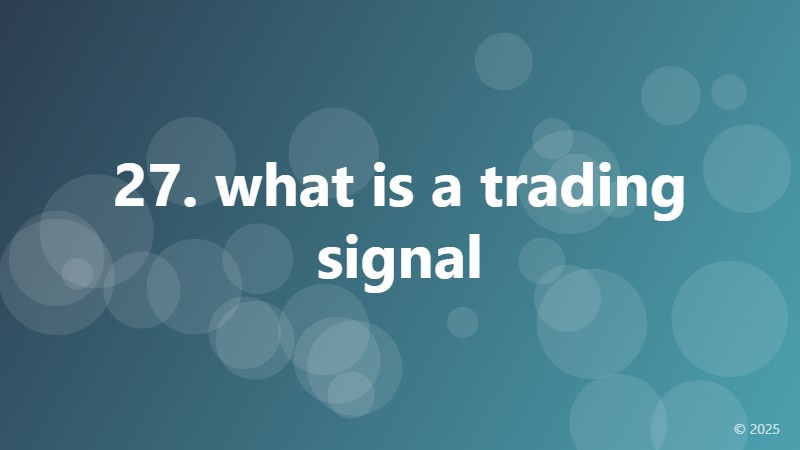27. what is a trading signal

Unlocking the Power of Trading Signals: A Comprehensive Guide
As a trader, making informed investment decisions is crucial to achieving success in the financial markets. With the vast amount of data available, it can be overwhelming to identify profitable trading opportunities. This is where trading signals come into play. But, what is a trading signal, and how can it help you make better investment decisions?
What is a Trading Signal?
A trading signal is a trigger that indicates a potential buying or selling opportunity in a financial market. It is a notification or alert that is generated based on a set of predefined rules or conditions, such as technical indicators, chart patterns, or news events. Trading signals can be generated manually by a trader or automatically by a trading algorithm or software.
Types of Trading Signals
There are two primary types of trading signals: discretionary and mechanical.
Discretionary Signals: These signals are generated by a human trader based on their analysis and interpretation of market data. Discretionary signals rely on the trader's expertise and experience to identify profitable trading opportunities.
Mechanical Signals: These signals are generated by a trading algorithm or software based on a set of predefined rules. Mechanical signals eliminate the need for human interpretation and can be more objective in their approach.
How Do Trading Signals Work?
Trading signals work by identifying potential trading opportunities based on a set of predefined conditions. These conditions can include:
Technical Indicators: Such as moving averages, relative strength index (RSI), and Bollinger Bands.
Chart Patterns: Such as head and shoulders, triangles, and wedges.
News Events: Such as earnings releases, economic indicators, and geopolitical events.
When a trading signal is generated, it is typically sent to the trader via email, SMS, or platform notification. The trader can then decide whether to act on the signal or ignore it.
Benefits of Trading Signals
Trading signals offer several benefits to traders, including:
Improved Trading Discipline: Trading signals can help traders stick to their trading plan and avoid impulsive decisions.
Increased Trading Opportunities: Trading signals can identify potential trading opportunities that may have been missed by the trader.
Reduced Market Noise: Trading signals can help filter out market noise and focus on high-probability trading opportunities.
Conclusion
In conclusion, trading signals are a powerful tool that can help traders make more informed investment decisions. By understanding what a trading signal is and how it works, traders can unlock the full potential of these signals and improve their trading performance. Whether you're a seasoned trader or just starting out, incorporating trading signals into your trading strategy can help you achieve greater success in the financial markets.